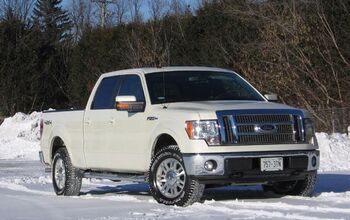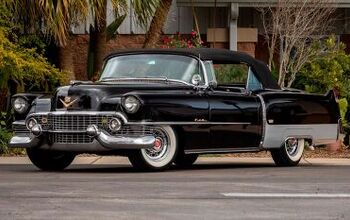Why The 2025 CAFE Standard Is Not Necessarily The 2025 CAFE Standard
The debate over 2025 CAFE standards will continue to rage all summer long, but if there’s one thing I learned from the industry lobbyists that I spoke to in Washington D.C. a few weeks ago, it’s that the media debate severely lags the conversation that’s going on behind closed doors. It’s a frustrating situation for commentators who hope to influence the process, but then D.C. debates are rarely about the ideas anyway. But environmental groups who hope to come between an industry that’s already relatively well-positioned for short-to-medium-term standards and a government that’s more interested in helping the industry than ever are still hoping to bring some public pressure to bear on an issue that, according to my sources anyway, was already largely settled weeks ago. Bloomberg [via AN [sub]] reports that
The auto industry is pressing the Obama administration for a promise to reevaluate rules that may more than double U.S. fuel economy standards by 2025 before they become final…
Still under negotiation are details of the midpoint review, including the timing, whether there will be a judicial review and whether the Environmental Protection Agency, the Transportation Department and California’s Air Resources Board will coordinate efforts, Gleberman said.
Environmental groups oppose the midterm review, saying it’s a gambit by automakers seeking to kill the program at the halfway point, when a president more friendly to the industry may be in office, said Dan Becker, director of the Washington-based Safe Climate Campaign.
According to my sources, a mid-way review of 2017-2025 standards was agreed to in principle by all the major stakeholder stakeholders some time ago. And for obvious reasons: with disruptive new technologies under development and the trajectory of fuel prices remaining an unknown quantity, nobody knows precisely what technologies will be available and what the market will demand come 2017. Like California’s ZEV mandate, a push to kill the mid-term review makes CAFE even less responsive to the market than it already is. If anything, environmental groups should embrace a review of current standards because there’s a good chance fuel prices will be higher and the nation will be more determined than ever to sacrifice for higher emissions standards. Besides, if CAFE loses touch with the market and has no opportunity to sync back up, the industry could be in for another disastrous downturn. And no matter how pro-regulation you are, it’s tough to argue that CAFE should be totally unresponsive to market forces. Unless you know exactly what the market will look like in 2025 (in which case, let’s start a hedge fund), trying to set 2025 emissions standards in stone now makes no sense at all.
More by Edward Niedermeyer
Latest Car Reviews
Read moreLatest Product Reviews
Read moreRecent Comments
- ToolGuy I do like the fuel economy of a 6-cylinder engine. Will be watching this with interest. 😉
- Carson D I'd go with the RAV4. It will last forever, and someone will pay you for it if you ever lose your survival instincts.
- THX1136 A less expensive EV would make it more attractive. For the record, I've never purchased a brand new vehicle as I have never been able to afford anything but used. I think the same would apply to an EV. I also tend to keep a vehicle way longer than most folks do - 10+ years. If there was a more affordable one right now then other things come to bear. There are currently no chargers in my immediate area (town of 16K). I don't know if I can afford to install the necessary electrical service to put one in my car port right now either. Other than all that, I would want to buy what I like from a cosmetic standpoint. That would be a Charger EV which, right now, doesn't exist and I couldn't afford anyway. I would not buy an EV just to be buying an EV. Nothing against them either. Most of my constraints are purely financial being 71 with a disabled wife and on a fixed income.
- ToolGuy Two more thoughts, ok three:a) Will this affordable EV have expressive C/D pillars, detailing on the rocker panels and many many things happening around the headlamps? Asking for a friend.b) Will this affordable EV have interior soft touch plastics and materials lifted directly from a European luxury sedan? Because if it does not, the automotive journalists are going to mention it and that will definitely spoil my purchase decision.c) Whatever the nominal range is, I need it to be 2 miles more, otherwise no deal. (+2 rule is iterative)
- Zerofoo No.My wife has worked from home for a decade and I have worked from home post-covid. My commute is a drive back and forth to the airport a few times a year. My every-day predictable commute has gone away and so has my need for a charge at home commuter car.During my most recent trip I rented a PHEV. Avis didn't bother to charge it, and my newly renovated hotel does not have chargers on the property. I'm not sure why rental fleet buyers buy plug-in vehicles.Charging infrastructure is a chicken and egg problem that will not be solved any time soon.

































Comments
Join the conversation